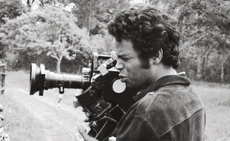Detroit Institute of Arts celebrates Black cinema
‘Regeneration: Black Cinema 1898-1971’ at the Detroit Institute of Arts (DIA) brings lost or forgotten films, filmmakers and performers to a contemporary audience

Inspired and named after a 1923 all-Black-cast movie, ‘Regeneration: Black Cinema 1898-1971’, which is currently on show at the Detroit Institute of Arts (DIA), explores the overlooked legacy of Black artists in American film from the dawn of cinema through to the civil rights movement. Originally organised by the Academy Museum of Motion Pictures, the exhibition aims to bring lost or forgotten films, filmmakers and performers to a contemporary audience, while at the same time, highlighting how trailblazing African American artists persisted, despite barriers of discrimination and prejudice, in order to showcase their talent, tenacity and commitment to creative expression.
‘Regeneration: Black Cinema 1898-1971’ at the DIA

In the Heat of the Night theatrical release poster, 1967
The show features nearly 200 historical items – among them photographs, newsreels, home movies, costumes, props and posters – as well as specially designed interactive elements, all juxtaposed with significant artworks by contemporary artists such as Theaster Gates, Glenn Ligon, Gary Simmons and Kara Walker. Historical highlights include home movie excerpts of legendary artists such as Josephine Baker and the Nicholas brothers, as well as film excerpts featuring the likes of Louis Armstrong, Dorothy Dandridge, Ossie Davis, Ruby Dee, Sidney Poitier, Paul Robeson and Cicely Tyson.

Gary Simmons, Balcony Seating Only, 2017
‘This critically important presentation chronicles much of what we know on-screen, but shares so much more of what happened off-screen,’ says the DIA’s film curator Elliot Wilhelm. ‘We will learn how each generation of these pioneering actors and filmmakers paved the way for the following generation to succeed, and how they served as symbols and advocates for social justice in and beyond Hollywood.’
Throughout the run of the show, the museum’s Detroit Film Theatre, which celebrates its 50th anniversary this year, will host a specially curated film series that ties together the exhibition and Detroit’s own cinema history. The series will include films that date back to the early years of cinema, such as Within Our Gates (1920), Body and Soul (1925), The Flying Ace (1926), and Princess Tam Tam (1932), as well as films with Detroit connections including Eleven PM (filmed in Detroit in 1928).
‘Regeneration: Black Cinema 1898-1971’ is on show at the Detroit Institute of Arts until 23 June 2024, dia.org

The Nicholas Brothers in a scene from Stormy Weather (1943)
Wallpaper* Newsletter
Receive our daily digest of inspiration, escapism and design stories from around the world direct to your inbox.
Anne Soward joined the Wallpaper* team as Production Editor back in 2005, fresh from a three-year stint working in Sydney at Vogue Entertaining & Travel. She prepares all content for print to ensure every story adheres to Wallpaper’s superlative editorial standards. When not dotting the i’s and crossing the t’s, she dreams about real estate.
-
 Three new coffee makers for a contemporary brew, from a casual cup to a full-on branded espresso
Three new coffee makers for a contemporary brew, from a casual cup to a full-on branded espressoThree new coffee makers, from AeroPress, Jura and Porsche x La Marzocco, range from the defiantly manual to the bells and whistles of a traditional countertop espresso machine
By Jonathan Bell Published
-
 Don't miss Luxembourg's retro-futuristic lab pavilion in Venice
Don't miss Luxembourg's retro-futuristic lab pavilion in VeniceAs the Venice Biennale enters its last few weeks, catch 'A Comparative Dialogue Act' at the Luxembourg Pavilion
By Amah-Rose Abrams Published
-
 A Berlin park atop an office building offers a new model of urban landscaping
A Berlin park atop an office building offers a new model of urban landscapingA Berlin park and office space by Grüntuch Ernst Architeken offer a symbiotic relationship between urban design and green living materials
By Michael Webb Published
-
 Wu Tsang reinterprets Carmen's story in Barcelona
Wu Tsang reinterprets Carmen's story in BarcelonaWu Tsang rethinks Carmen with an opera-theatre hybrid show and a film installation, recently premiered at MACBA in Barcelona (until 3 November)
By Emily Steer Published
-
 Miu Miu’s Women’s Tales film series comes to life for Art Basel Paris
Miu Miu’s Women’s Tales film series comes to life for Art Basel ParisIn ‘Tales & Tellers’, interdisciplinary artist Goshka Macuga brings Miu Miu’s Women’s Tales film series for Art Basel Paris to life for the public programme
By Amah-Rose Abrams Published
-
 Don't miss these films at the BFI London Film Festival 2024
Don't miss these films at the BFI London Film Festival 2024The BFI has announced the lineup for their 68th festival, and it's a stellar one
By Billie Walker Published
-
 Brutalism in film: the beautiful house that forms the backdrop to The Room Next Door
Brutalism in film: the beautiful house that forms the backdrop to The Room Next DoorThe Room Next Door's production designer discusses mood-boarding and scene-setting for a moving film about friendship, fragility and the final curtain
By Anne Soward Published
-
 ‘Gas Tank City’, a new monograph by Andrew Holmes, is a photorealist eye on the American West
‘Gas Tank City’, a new monograph by Andrew Holmes, is a photorealist eye on the American West‘Gas Tank City’ chronicles the artist’s journey across truck-stop America, creating meticulous drawings of fleeting moments
By Jonathan Bell Published
-
 Jobbing actors and the anxious young man: 'In Camera' on the unrelenting nature of acting
Jobbing actors and the anxious young man: 'In Camera' on the unrelenting nature of actingDirector, Naqqash Khalid’s debut feature, 'In Camera,' explores identity politics through the lens of acting
By Zoe Whitfield Published
-
 How Amy Sall is highlighting the beauty of African cinema
How Amy Sall is highlighting the beauty of African cinemaAmy Sall is highlighting the cultural impact of African filmmakers with ‘The African Gaze: Photography, Cinema and Power’, published by Thames & Hudson
By Marris Adikwu Published
-
 The Substance may be grotesque, but it is not body horror
The Substance may be grotesque, but it is not body horrorThe Substance, Coralie Fargeat's sophomore feature film, has already been granted the moniker body horror, due its visceral imagery and mutations of the body
By Billie Walker Published